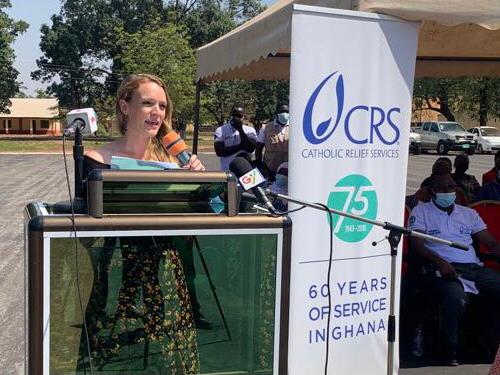The Head of Programmes at the Catholic Relief Service(CRS), Madam Carolyn Edlebeck, addressing participants in Tamale
Head of Programmes at the Catholic Relief Service(CRS), Carolyn Edlebeck, has disclosed that less than one per cent of communities in Tamale are certified as open defecation free (ODF) with residents mainly depending on public toilets (nearly 60% of adults) that do not meet their needs for cleanliness, privacy, and convenience.
In addition, 81% of households do not have private latrines which have resulted in the prevalence of diarrhea and cholera.
According to her, public investment in the water and sanitation sector in Ghana has not kept pace with economic growth and urbanization noting that basic sanitation services currently stand at 17% for rural coverage and 25% for urban coverage.
“Only one in five households has an improved toilet in the home with 22% of the population still practicing open defecation. Furthermore, over 13 million Ghanaians use shared facilities concentrated primarily in low-income urban settlements.”
Addressing participants at this year’s World Toilet Day Celebration in Tamale on the theme “Valuing Toilets” she said CRS has been working with the Tamale Metropolitan Assembly, Sagnerigu Municipal Assembly, Ghana Water Company Limited, and other key stakeholders, to help address water security and sanitation challenges in Tamale.
Madam Edlebeck indicated that the past two years, Urban WASH and Resilience Project together with key stakeholders have facilitated the construction of 505 household toilets in Tamale Metropolis and Sagnerigu Municipality serving over 5,000 beneficiaries, rehabilitated 7 public toilets with 3 of them certified as WASH friendly adding that they have also trained 7 area mechanics to provide borehole repair services to communities to ensure sustained supply of water in communities and trained 30 Water and Sanitation Management Teams in properly managing water points in our communities.
“CRS together with key partners are at advanced stages of establishing the Tamale Water Fund to create a dependable funding stream for strategic financing for nature-based restoration projects to meet the water quantity and quality goals, and ecosystem protection in the White Volta Basin. A steering committee has been inaugurated and is working to register the water fund within the laws of Ghana and to improve collaboration and coordination, CRS, together with Tamale Metropolitan, Sagnerigu Municipal Assemblies, and other stakeholders have drafted a Citywide Inclusive WASH action plan for Greater Tamale. This WASH action plan seeks to leverage sector players’ resources (Private, Public, CBOs and NGOs) to address key gaps along the entire sanitation service chain in Greater Tamale.”
She explained that the Citywide WASH action plan focuses on 6 key sections: Resource Mobilization, Solid waste management, Enhanced coordination among sector actors, eradicating open defecation, Institutional WASH, Sanitation in public places, and Improving Access to Potable Water.
“Three key activities within the plan being highlighted today are; coordinating and regulating the activities of manual emptiers (service providers), Improving Institutional WASH, and encouraging the construction and use of household toilets.”
At this year’s World Toilet Day Celebration in Tamale, the Catholic Relief Services(CRS) outdoor the manual emptiers association and equip the Waste Management Department with working tools to coordinate and regulate their activities as well as launching the process for upcoming Senior High Schools ODF league table to highlight and bring to the forefront the sanitation situation in SHS with the hope receiving the much-needed attention.
Tamale Metropolitan and Sagnerigu Municipal Assemblies have made significant gains in encouraging and facilitating the construction of toilets by households with the support and contribution of partners and stakeholders who have joined in the celebration today.
She called on stakeholders to collaborate to leverage each other’s resources and strengths to build resilient and dedicated institutions to deliver carefully thought-out interventions, as well as advocate for institutional and policy reforms that are required for effective WASH service delivery.
FROM Eric Kombat, Tamale


